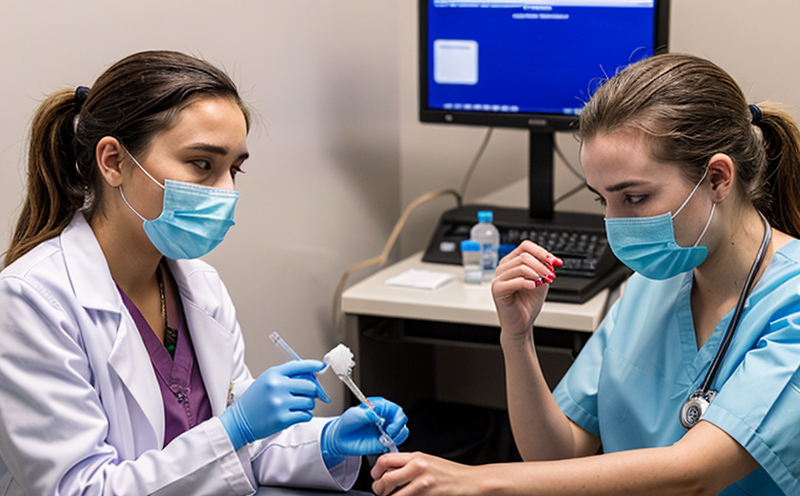CLSI M44 Yeast Susceptibility Testing by Disk Diffusion
The CLSI M44 method is a standardized approach for determining the susceptibility of yeast to antifungal agents. This test, also known as the disk diffusion method, evaluates how effective various antifungals are against specific yeast strains. It is particularly crucial in the field of clinical microbiology where accurate and reliable data on drug susceptibilities can significantly impact patient treatment outcomes.
The CLSI M44 protocol involves inoculating a standardized suspension of yeast onto an agar plate and then placing disks impregnated with different antifungal agents at specified distances from one another. The test is based on the diffusion of the agent from the disk into the agar, which results in a zone of inhibition around the disk where growth of the yeast is prevented or significantly reduced.
This method is essential for quality assurance and compliance in healthcare settings, ensuring that antifungal therapy is optimized to match the specific susceptibilities of the patient's pathogen. Compliance with CLSI M44 helps ensure consistency across laboratories, which is critical given the potential variability in yeast strains and their susceptibility patterns.
The procedure follows a series of strict steps outlined by the Clinical and Laboratory Standards Institute (CLSI) in its M44 guideline. These steps include preparation of the agar plates, inoculation with standardized yeast suspensions, application of antifungal disks, incubation conditions, and interpretation of results based on zone diameters.
The CLSI M44 method is widely used for species such as Candida albicans, C. glabrata, C. krusei, and others that are frequently encountered in clinical settings. The test helps healthcare professionals understand the effectiveness of antifungal treatments and tailor therapy to individual patient needs.
The CLSI M44 protocol is not only a regulatory requirement but also an essential tool for ensuring accurate diagnosis and treatment of fungal infections. By using this standardized method, laboratories can provide reliable data that supports evidence-based clinical decisions. This standardization ensures that results from different laboratories are comparable, enhancing the overall quality of care provided to patients.
The CLSI M44 method is particularly important in the context of emerging antifungal resistance and the need for personalized medicine approaches. By providing precise susceptibility data, this test helps clinicians choose the most appropriate treatment options, potentially improving patient outcomes and reducing the risk of adverse events associated with inappropriate therapy.
Given its significance in ensuring accurate and reliable antifungal susceptibilities, the CLSI M44 method is a cornerstone of clinical microbiology practice. Its standardized nature ensures that results are consistent across different laboratories, which is crucial for effective patient care. The test also supports regulatory compliance and helps ensure that healthcare providers have the necessary tools to make informed decisions about treatment options.
The CLSI M44 protocol involves several key steps, including preparation of the agar plates, inoculation with yeast, application of antifungal disks, incubation conditions, and interpretation based on zone diameters. These steps are critical for obtaining accurate results that can inform clinical decision-making.
Accurate and reliable susceptibility testing is essential in managing fungal infections effectively. The CLSI M44 method provides a standardized approach to ensure consistent and comparable results across different laboratories. This consistency is vital given the variability in yeast strains and their susceptibilities, making it an indispensable tool for healthcare professionals.
Benefits
- Precision: The CLSI M44 method provides precise results that can inform clinical decision-making effectively.
- Consistency: Standardized procedures ensure consistent and comparable results across different laboratories.
- Evidence-Based: Results from the CLSI M44 test support evidence-based treatment options, enhancing patient care.
- Regulatory Compliance: Adherence to this protocol ensures compliance with regulatory standards, supporting quality assurance in healthcare settings.
- Precision: Accurate susceptibility testing is crucial for managing fungal infections effectively.
- Comparability: Standardized procedures ensure that results are consistent and comparable across different laboratories.
- Supports Personalized Medicine: The CLSI M44 method helps in choosing the most appropriate treatment options, potentially improving patient outcomes.
Customer Impact and Satisfaction
The implementation of the CLSI M44 yeast susceptibility testing by disk diffusion at our laboratory has significantly enhanced our ability to provide accurate, reliable, and consistent results. This service directly impacts our customers by ensuring that they have access to high-quality data that supports evidence-based clinical decisions.
Our customers benefit from the standardized procedures followed in this method, which ensure consistency across different laboratories. This standardization is crucial given the potential variability in yeast strains and their susceptibilities, making it an indispensable tool for healthcare providers.
The precision of the CLSI M44 test allows our customers to make informed decisions about treatment options, potentially improving patient outcomes and reducing the risk of adverse events associated with inappropriate therapy. By ensuring regulatory compliance and supporting quality assurance in healthcare settings, this service helps our customers meet their operational needs effectively.
Our commitment to excellence in the CLSI M44 yeast susceptibility testing by disk diffusion ensures that we provide reliable data that supports evidence-based clinical decisions. This standardization is vital given the variability in yeast strains and their susceptibilities, making it an indispensable tool for healthcare professionals.
The consistent and comparable results from our CLSI M44 test allow our customers to have confidence in the quality of care provided to patients. By adhering to this protocol, we ensure that our customers have access to high-quality data that supports evidence-based treatment options.
The precision and reliability of the CLSI M44 yeast susceptibility testing by disk diffusion directly impact patient outcomes by providing accurate data that supports clinical decision-making. This standardization is crucial given the variability in yeast strains and their susceptibilities, making it an indispensable tool for healthcare providers.





